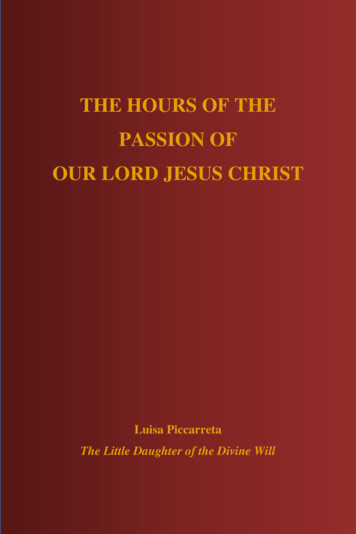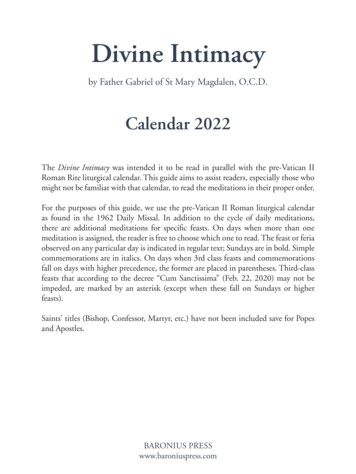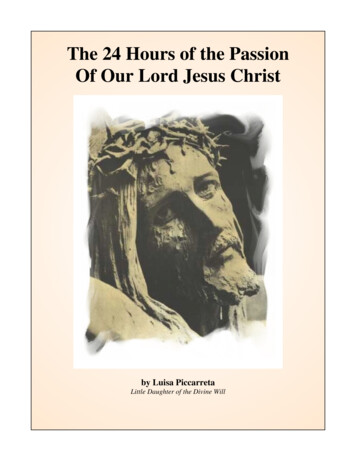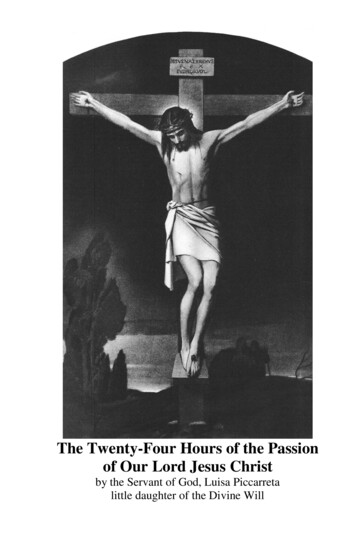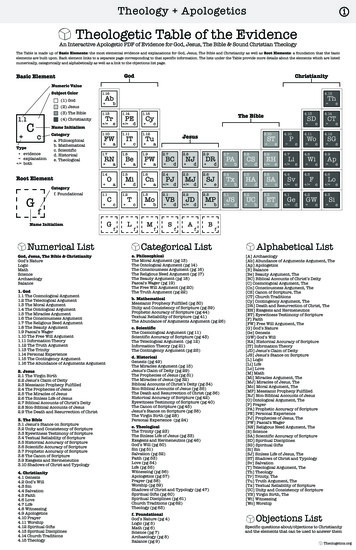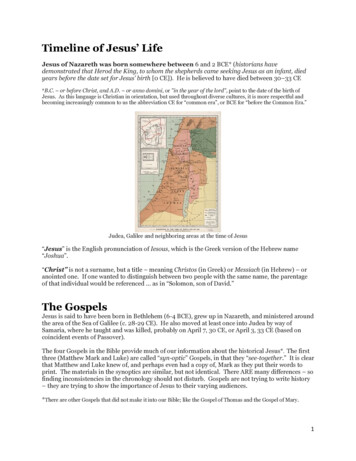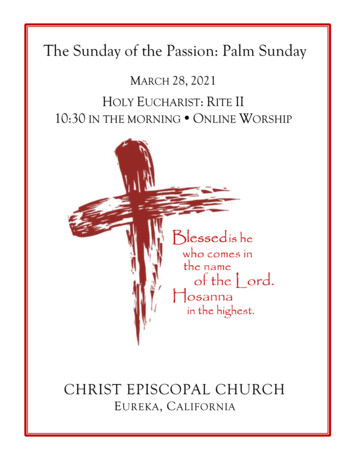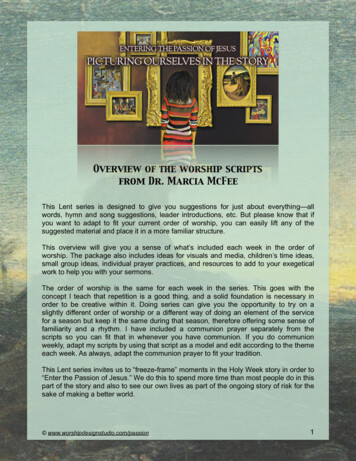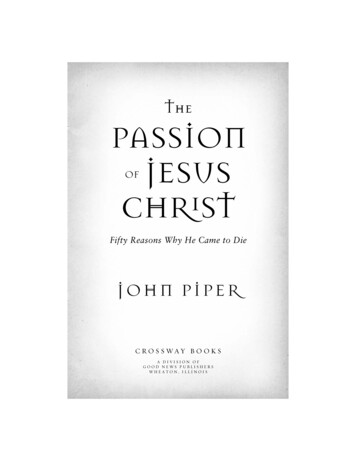
Transcription
ThePASSIONJESUSCHRISTOFFifty Reasons Why He Came to DieJOHN PIPERC R O S S W AY B O O K SA DIVISION OFGOOD NEWS PUBLISHERSWHEATON, ILLINOIS
The Passion of Jesus ChristCopyright 2004 by Desiring God FoundationPublished by Crossway BooksA division of Good News Publishers1300 Crescent StreetWheaton, Illinois 60187All rights reserved. No part of this publication may be reproduced, stored ina retrieval system or transmitted in any form by any means, electronic,mechanical, photocopy, recording or otherwise, without the prior permissionof the publisher, except as provided by USA copyright law.Italics in biblical quotes indicate emphasis added.Unless otherwise indicated, all Scripture quotations are taken from:The Holy Bible: English Standard Version, copyright 2001by Crossway Bibles, a division of Good News Publishers. Used bypermission. All rights reserved.Cover design: Josh DennisCover photo: PhotonicaFirst printing, 2004Printed in the United States of AmericaLibrary of Congress Cataloging-in-Publication DataPiper, John, 1946The Passion of Jesus Christ : fifty reasons why he came to die /John Piper.p. cm.ISBN 1-58134-608-5 (TPB : alk. paper)1. Jesus Christ—Passion. I. 14151413131212111110100990880770660554043
TOJesus ChristDespised and rejected by men;a man of sorrows, and acquainted with grief . . .we esteemed him stricken, smitten by God, and afflicted.But he was wounded for our transgressions;he was crushed for our iniquities;upon him was the chastisement that brought us peace,and with his stripes we are healed.All we like sheep have gone astray;we have turned every one to his own way;and the LORD has laid on him the iniquity of us all.He was oppressed, and he was afflicted,yet he opened not his mouth;like a lamb that is led to the slaughter,and like a sheep that before its shearers is silent,so he opened not his mouth. . . .He was cut off out of the land of the living,stricken for the transgression of my people. . . .There was no deceit in his mouth.Yet it was the will of the LORD to crush him;he has put him to grief.The prophet IsaiahChapter 53, Verses 3-10
ContentsIntroduction11The Christ, the Crucifixion, and the Concentration CampsFifty Reasons WhyChrist Suffered and Died1 To Absorb the Wrath of God202 To Please His Heavenly Father223 To Learn Obedience and Be Perfected244 To Achieve His Own Resurrection from the Dead265 To Show the Wealth of God’s Love and Gracefor Sinners286 To Show His Own Love for Us307 To Cancel the Legal Demands of the LawAgainst Us328 To Become a Ransom for Many349 For the Forgiveness of Our Sins3610 To Provide the Basis for Our Justification3811 To Complete the Obedience That BecomesOur Righteousness4012 To Take Away Our Condemnation4213 To Abolish Circumcision and All Ritualsas the Basis of Salvation4414 To Bring Us to Faith and Keep Us Faithful4615 To Make Us Holy, Blameless, and Perfect4816 To Give Us a Clear Conscience5017 To Obtain for Us All Things That Are Good for Us52
18 To Heal Us from Moral and Physical Sickness5419 To Give Eternal Life to All Who Believe on Him5620 To Deliver Us from the Present Evil Age5821 To Reconcile Us to God6022 To Bring Us to God6223 So That We Might Belong to Him6424 To Give Us Confident Access to the Holiest Place6625 To Become for Us the Place Where We Meet God6826 To Bring the Old Testament Priesthood to an Endand Become the Eternal High Priest7027 To Become a Sympathetic and Helpful Priest7228 To Free Us from the Futility of Our Ancestry7429 To Free Us from the Slavery of Sin7630 That We Might Die to Sin and Live to Righteousness7831 So That We Would Die to the Law andBear Fruit for God8032 To Enable Us to Live for Christ and Not Ourselves8233 To Make His Cross the Ground of All Our Boasting8434 To Enable Us to Live by Faith in Him8635 To Give Marriage Its Deepest Meaning8836 To Create a People Passionate for Good Works9037 To Call Us to Follow His Example of Lowlinessand Costly Love9238 To Create a Band of Crucified Followers9439 To Free Us from Bondage to the Fear of Death9640 So That We Would Be with Him ImmediatelyAfter Death9841 To Secure Our Resurrection from the Dead10042 To Disarm the Rulers and Authorities102
43 To Unleash the Power of God in the Gospel10444 To Destroy the Hostility Between Races10645 To Ransom People from Every Tribe and Languageand People and Nation10846 To Gather All His Sheep from Around the World11047 To Rescue Us from Final Judgment11248 To Gain His Joy and Ours11449 So That He Would Be Crowned with Gloryand Honor11650 To Show That the Worst Evil Is Meant by Godfor Good118A Prayer121Books on the Historical Reliabilityof the Bible’s Record123Notes125Resources from Desiring God Ministries126
INTRODUCTIONThe Christ, the Crucifixion,and the Concentration Campshe most important question of the twenty-first century is:Why did Jesus Christ suffer so much? But we will never seethis importance if we fail to go beyond human cause. The ultimate answer to the question, Who crucified Jesus? is: God did.It is a staggering thought. Jesus was his Son. And the sufferingwas unsurpassed. But the whole message of the Bible leads to thisconclusion.TGod Meant It for GoodThe Hebrew prophet Isaiah said, “It was the will of the LORD tocrush him; he has put him to grief” (Isaiah 53:10). The ChristianNew Testament says, “[God] did not spare his own Son but gavehim up for us all” (Romans 8:32). “God put [Christ] forward . . .by his blood, to be received by faith” (Romans 3:25).But how does this divine act relate to the horribly sinful actionsof the men who killed Jesus? The answer given in the Bible isexpressed in an early prayer: “There were gathered togetheragainst your holy servant Jesus . . . both Herod and Pontius Pilate,along with the Gentiles and the peoples of Israel, to do whateveryour hand and your plan had predestined to take place” (Acts4:27-28). The depth and scope of this divine sovereignty takes ourbreath away. But it is also the key to our salvation. God planned11
The Passion of Jesus Christit, and by the means of wicked men, great good has come to theworld. To paraphrase a word of the Jewish Torah: They meant itfor evil, but God meant it for good (Genesis 50:20).And since God meant it for good, we must move beyond thequestion of human cause to divine purpose. The central issue ofJesus’ death is not the cause, but the purpose—the meaning. Manmay have his reasons for wanting Jesus out of the way. But onlyGod can design it for the good of the world. In fact, God’s purposes for the world in the death of Jesus are unfathomable. I amscraping the surface in this little book as I introduce you to fiftyof them. My aim is to let the Bible speak. This is where we hearthe word of God. I hope that these pointers will set you on an endless quest to know more and more of God’s great design in thedeath of his Son.What Does the Word P ASSION Mean?We associate at least four things with the word passion: sexualdesire, zeal for a task, an oratorio by J. S. Bach, and the sufferingsof Jesus Christ. The word comes from a Latin word meaning suffering. That is the way I am using it here—the sufferings and deathof Jesus Christ. But it relates to all the other passions as well. Itdeepens sex, inspires music, and carries forward the greatest causein the world.How Was the Passion of Jesus Unique?Why did the suffering and execution of a man who was convictedand condemned as a pretender to the throne of Rome unleash, inthe next three centuries, a power to suffer and to love that transformed the Roman Empire, and to this day is shaping the world?The answer is that the passion of Jesus was absolutely unique, andhis resurrection from the dead three days later was an act of Godto vindicate what his death achieved.12
IntroductionHis passion was unique because he was more than a merehuman. Not less. He was, as the ancient Nicene Creed says, “veryGod of very God.” This is the testimony of those who knew himand were inspired by him to explain who he is. The apostle Johnreferred to Christ as “the Word” and wrote, “In the beginning wasthe Word, and the Word was with God, and the Word was God.He was in the beginning with God. All things were made throughhim, and without him was not any thing made that was made. . . .And the Word became flesh and dwelt among us, and we have seenhis glory, glory as of the only Son from the Father, full of grace andtruth” (John 1:1-3, 14).Then add to his deity that he was utterly innocent in his suffering. Not just innocent of the charge of blasphemy, but of all sin.One of his closest disciples said, “He committed no sin, neither wasdeceit found in his mouth” (1 Peter 2:22). Then add to this uniqueness that he embraced his own death with absolute authority. Oneof the most stunning statements Jesus ever made was about his owndeath and resurrection: “I lay down my life that I may take it upagain. No one takes it from me, but I lay it down of my ownaccord. I have authority to lay it down, and I have authority to takeit up again. This charge I have received from my Father” (John10:17-18). The controversy about who killed Jesus is marginal. Hechose to die. His Father ordained it. He embraced it.His Passion Was Vindicated by theResurrectionBecause of this unparalleled passion, God raised Jesus from thedead. It happened three days later. Early Sunday morning he rosefrom the dead. He appeared numerous times to his disciples forforty days before his ascension to heaven (Acts 1:3).The disciples were slow to believe that it really happened. Theywere not gullible primitives. They were down-to-earth tradesmen.They knew people did not rise from the dead. At one point Jesus13
The Passion of Jesus Christinsisted on eating fish to prove to them that he was not a ghost(Luke 24:39-43). This was not the resuscitation of a corpse. It wasthe resurrection of the God-Man, into an indestructible new life.The early church acclaimed him Lord of heaven and earth. Theysaid, “After making purification for sins, he sat down at the righthand of the Majesty on high” (Hebrews 1:3). Jesus had finishedthe work God gave him to do, and the resurrection was the proofthat God was satisfied. This book is about what Jesus’ passionaccomplished for the world.The Passion of Christ and thePassion of AuschwitzIt is a tragedy that the story of Christ’s passion has produced antiSemitism against Jews and crusading violence against Muslims.We Christians are ashamed of many of our ancestors who did notact in the spirit of Christ. No doubt there are traces of this plaguein our own souls. But true Christianity—which is radically different from Western culture, and may not be found in many Christianchurches—renounces the advance of religion by means of violence.“My kingdom is not of this world,” Jesus said. “If my kingdomwere of this world, my servants would have been fighting” (John18:36). The way of the cross is the way of suffering. Christians arecalled to die, not kill, in order to show the world how they areloved by Christ.Today this love humbly and boldly commends Christ, no matter what it costs, to all peoples as the only saving way to God.“Jesus said to him, ‘I am the way, and the truth, and the life. Noone comes to the Father except through me’” (John 14:6). But letit be crystal-clear: It is not Christian to humiliate or scorn ordespise or persecute with prideful putdowns, or pogroms, or crusades, or concentration camps. These were and are, very simplyand horribly, disobedience to Jesus Christ. Unlike many of his fol14
Introductionlowers, he prayed from the cross, “Father, forgive them, for theyknow not what they do” (Luke 23:34).The passion of Jesus Christ is the most important event in history, and the most explosive political and personal issue of thetwenty-first century. The denial that Christ was crucified is like thedenial of the Holocaust. For some it’s simply too horrific to affirm.For others it’s an elaborate conspiracy to coerce religious sympathy. But the deniers live in a historical dreamworld. Jesus Christsuffered unspeakably and died. So did Jews.I am not the first to link Calvary and the concentrationcamps—the suffering of Jesus Christ and the suffering of Jewishpeople. In his heart-wrenching, innocence-shattering, mouthshutting book Night, Elie Wiesel tells of his experience as ateenager with his father in the concentration camps of Auschwitz,Buna, and Buchenwald. There was always the threat of “theselection”—the taking away of the weak to be killed and burnedin the ovens.At one point—and only one—Wiesel links Calvary and thecamps. He tells of an old rabbi, Akiba Dumer.Akiba Dumer left us, a victim of the selection. Lately, he hadwandered among us, his eyes glazed, telling everyone of hisweakness: “I can’t go on . . . It’s all over . . .” It was impossible to raise his morale. He didn’t listen to what we toldhim. He could only repeat that all was over for him, that hecould no longer keep up the struggle, that he had no strengthleft, nor faith. Suddenly his eyes would become blank, nothing but two open wounds, two pits of terror.1Then Wiesel makes this provocative comment: “Poor AkibaDumer, if he could have gone on believing in God, if he couldhave seen a proof of God in this Calvary, he would not have beentaken by the selection.”2 I will not presume to put any words in15
The Passion of Jesus ChristElie Wiesel’s mouth. I am not sure what he meant. But it pressesthe question: Why the link between Calvary and the concentration camp?When I ask this question, I am not thinking of cause or blame.I am thinking of meaning and hope. Is there a way that Jewish suffering may find, not its cause, but its final meaning in the suffering of Jesus Christ? Is it possible to think, not of Christ’s passionleading to Auschwitz, but of Auschwitz leading to an understanding of Christ’s passion? Is the link between Calvary and thecamps a link of unfathomable empathy? Perhaps only Jesus in theend can know what happened during the “one long night”3 ofJewish suffering. And perhaps a generation of Jewish people,whose grandparents endured their own noxious crucifixion, willbe able, as no others, to grasp what happened to the Son of Godat Calvary. I leave it as a question. I do not know.But this I know: Those ostensible “Christians” who built thecamps never knew the love that moved Jesus Christ towardCalvary. They never knew the Christ, who instead of killing tosave a culture, died to save the world. But there are someChristians—the true Christians—who have seen the meaning ofthe passion of Jesus Christ, and have been broken and humbledby his suffering. Could it be that these, perhaps better than many,might be able to see and, at least, begin to fathom the suffering ofJewish people?What an irony that Christians have been anti-Semitic! Jesusand all his early followers were Jews. People from every group inPalestine were involved in his crucifixion (not just Jews), and people from every group opposed it (including Jews). God himself wasthe chief Actor in the death of his Son, so that the main questionis not, Which humans brought about the death of Jesus? but, Whatdid the death of Jesus bring about for humans—including Jewsand Muslims and Buddhists and Hindus and nonreligious secularists—and all people everywhere?16
IntroductionWhen all is said and done, the most crucial question is: Why?Why did Christ suffer and die? Not why in the sense of cause, butwhy in the sense of purpose. What did Christ achieve by his passion? Why did he have to suffer so much? What great thing washappening on Calvary for the world?That’s what the rest of this book is about. I have gathered fromthe New Testament fifty reasons why Christ suffered and died.Not fifty causes, but fifty purposes. Infinitely more important thanwho killed Jesus is the question: What did God achieve for sinnerslike us in sending his Son to die? To that we now turn.17
Fifty Reasons WhyChrist Sufferedand Died
Christ Suffered and Died . . .1To Absorb the Wrathof GodChrist redeemed us from the curse of the law by becoming acurse for us—for it is written,“Cursed is everyone who is hanged on a tree.”Galatians 3:13God put [Christ] forward as a propitiation by his blood,to be received by faith. This was to show God’s righteousness,because in his divine forbearance he had passed over former sins.Romans 3:25In this is love, not that we have loved God but that he loved usand sent his Son to be the propitiation for our sins.1 John 4:10f God were not just, there would be no demand for his Son tosuffer and die. And if God were not loving, there would be no willingness for his Son to suffer and die. But God is both just and loving.Therefore his love is willing to meet the demands of his justice.God’s law demanded, “You shall love the LORD your God withall your heart and with all your soul and with all your might”(Deuteronomy 6:5). But we have all loved other things more. Thisis what sin is—dishonoring God by preferring other things overhim, and acting on those preferences. Therefore, the Bible says,“All have sinned and fall short of the glory of God” (Romans3:23). We glorify what we enjoy most. And it isn’t God.I20
Therefore sin is not small, because it is not against a smallSovereign. The seriousness of an insult rises with the dignity of theone insulted. The Creator of the universe is infinitely worthy ofrespect and admiration and loyalty. Therefore, failure to love himis not trivial—it is treason. It defames God and destroys humanhappiness.Since God is just, he does not sweep these crimes under the rugof the universe. He feels a holy wrath against them. They deserve tobe punished, and he has made this clear: “For the wages of sin isdeath” (Romans 6:23). “The soul who sins shall die” (Ezekiel 18:4).There is a holy curse hanging over all sin. Not to punish wouldbe unjust. The demeaning of God would be endorsed. A lie wouldreign at the core of reality. Therefore, God says, “Cursed be everyone who does not abide by all things written in the Book of theLaw, and do them” (Galatians 3:10; Deuteronomy 27:26).But the love of God does not rest with the curse that hangs overall sinful humanity. He is not content to show wrath, no matter howholy it is. Therefore God sends his own Son to absorb his wrath andbear the curse for all who trust him. “Christ redeemed us from thecurse of the law by becoming a curse for us” (Galatians 3:13).This is the meaning of the word “propitiation” in the textquoted above (Romans 3:25). It refers to the removal of God’swrath by providing a substitute. The substitute is provided by Godhimself. The substitute, Jesus Christ, does not just cancel thewrath; he absorbs it and diverts it from us to himself. God’s wrathis just, and it was spent, not withdrawn.Let us not trifle with God or trivialize his love. We will neverstand in awe of being loved by God until we reckon with the seriousness of our sin and the justice of his wrath against us. Butwhen, by grace, we waken to our unworthiness, then we may lookat the suffering and death of Christ and say, “In this is love, notthat we have loved God but that he loved us and sent his Son tobe the [wrath-absorbing] propitiation for our sins” (1 John 4:10).21
Christ Suffered and Died . . .2To Please HisHeavenly FatherYet it was the will of the LORD to crush him;he has put him to grief.Isaiah 53:10Christ loved us and gave himself up for us,a fragrant offering and sacrifice to God.Ephesians 5:2esus did not wrestle his angry Father to the floor of heaven andtake the whip out of his hand. He did not force him to be merciful to humanity. His death was not the begrudging consent ofGod to be lenient to sinners. No, what Jesus did when he sufferedand died was the Father’s idea. It was a breathtaking strategy,conceived even before creation, as God saw and planned the history of the world. That is why the Bible speaks of God’s “purposeand grace, which he gave us in Christ Jesus before the ages began”(2 Timothy 1:9).Already in the Jewish Scriptures the plan was unfolding. Theprophet Isaiah foretold the sufferings of the Messiah, who was totake the place of sinners. He said that the Christ would be “smitten by God” in our place.JSurely he has borne our griefs and carried our sorrows; yet weesteemed him stricken, smitten by God, and afflicted. But hewas wounded for our transgressions; he was crushed for our22
iniquities. . . . All we like sheep have gone astray; we haveturned every one to his own way; and the LORD has laid onhim the iniquity of us all. (Isaiah 53:4-6)But what is most astonishing about this substitution of Christfor sinners is that it was God’s idea. Christ did not intrude onGod’s plan to punish sinners. God planned for him to be there.One Old Testament prophet says, “It was the will of the LORD tocrush him; he has put him to grief” (Isaiah 53:10).This explains the paradox of the New Testament. On the onehand, the suffering of Christ is an outpouring of God’s wrathbecause of sin. But on the other hand, Christ’s suffering is a beautiful act of submission and obedience to the will of the Father. SoChrist cried from the cross, “My God, my God, why have you forsaken me?” (Matthew 27:46). And yet the Bible says that the suffering of Christ was a fragrance to God. “Christ loved us and gavehimself up for us, a fragrant offering and sacrifice to God”(Ephesians 5:2).Oh, that we might worship the terrible wonder of the love ofGod! It is not sentimental. It is not simple. For our sake God didthe impossible: He poured out his wrath on his own Son—the onewhose submission made him infinitely unworthy to receive it. Yetthe Son’s very willingness to receive it was precious in God’s sight.The wrath-bearer was infinitely loved.23
Christ Suffered and Died . . .3To Learn Obedienceand Be PerfectedAlthough he was a son, he learned obediencethrough what he suffered.Hebrews 5:8For it was fitting that he, for whom and by whom all things exist,in bringing many sons to glory,should make the founder of their salvationperfect through suffering.Hebrews 2:10he very book in the Bible that says Christ “learned obedience” through suffering, and that he was “made perfect”through suffering, also says that he was “without sin.” “In everyrespect [Christ] has been tempted as we are, yet without sin”(Hebrews 4:15).This is the consistent teaching of the Bible. Christ was sinless.Although he was the divine Son of God, he was really human, withall our temptations and appetites and physical weaknesses. Therewas hunger (Matthew 21:18) and anger and grief (Mark 3:5) andpain (Matthew 17:12). But his heart was perfectly in love withGod, and he acted consistently with that love: “He committed nosin, neither was deceit found in his mouth” (1 Peter 2:22).Therefore, when the Bible says that Jesus “learned obediencethrough what he suffered,” it doesn’t mean that he learned to stopdisobeying. It means that with each new trial he learned in prac-T24
tice—and in pain—what it means to obey. When it says that hewas “made perfect through suffering,” it doesn’t mean that hewas gradually getting rid of defects. It means that he was gradually fulfilling the perfect righteousness that he had to have inorder to save us.That’s what he said at his baptism. He didn’t need to be baptized because he was a sinner. Rather, he explained to John theBaptist, “Thus it is fitting for us to fulfill all righteousness”(Matthew 3:15).The point is this: If the Son of God had gone from incarnationto the cross without a life of temptation and pain to test his righteousness and his love, he would not be a suitable Savior for fallenman. His suffering not only absorbed the wrath of God. It also fulfilled his true humanity and made him able to call us brothers andsisters (Hebrews 2:17).25
Christ Suffered and Died . . .4To Achieve His OwnResurrection fromthe DeadNow may the God of peace who brought again from the deadour Lord Jesus, the great shepherd of the sheep,by the blood of the eternal covenant,equip you with everything good that you may do his will.Hebrews 13:20-21he death of Christ did not merely precede his resurrection—it was the price that obtained it. That’s why Hebrews 13:20says that God brought him from the dead “by the blood of theeternal covenant.”The “blood of the . . . covenant” is the blood of Jesus. As hesaid, “This is my blood of the covenant” (Matthew 26:28). Whenthe Bible speaks of the blood of Jesus, it refers to his death. Nosalvation would be accomplished by the mere bleeding of Jesus.His bleeding to death is what makes his blood-shedding crucial.Now what is the relationship between this shedding of Jesus’blood and the resurrection? The Bible says he was raised not justafter the blood-shedding, but by it. This means that what the deathof Christ accomplished was so full and so perfect that the resurrection was the reward and vindication of Christ’s achievement indeath.The wrath of God was satisfied with the suffering and deathT26
of Jesus. The holy curse against sin was fully absorbed. The obedience of Christ was completed to the fullest measure. The priceof forgiveness was totally paid. The righteousness of God wascompletely vindicated. All that was left to accomplish was the public declaration of God’s endorsement. This he gave by raising Jesusfrom the dead.When the Bible says, “If Christ has not been raised, your faithis futile and you are still in your sins” (1 Corinthians 15:17), thepoint is not that the resurrection is the price paid for our sins. Thepoint is that the resurrection proves that the death of Jesus is anall-sufficient price. If Jesus did not rise from the dead, then hisdeath was a failure, God did not vindicate his sin-bearing achievement, and we are still in our sins.But in fact “Christ was raised from the dead by the glory of theFather” (Romans 6:4). The success of his suffering and death wasvindicated. And if we put our trust in Christ, we are not still in oursins. For “by the blood of the eternal covenant,” the GreatShepherd has been raised and lives forever.27
Christ Suffered and Died . . .5To Show the Wealth ofGod’s Love andGrace for SinnersOne will scarcely die for a righteous person—though perhaps for a good person one would dare even to die—but God shows his love for us in that while we were still sinners,Christ died for us.Romans 5:7-8For God so loved the world, that he gave his only Son,that whoever believes in him should not perish but have eternal life.John 3:16In him we have redemption through his blood,the forgiveness of our trespasses,according to the riches of his grace.Ephesians 1:7he measure of God’s love for us is shown by two things. Oneis the degree of his sacrifice in saving us from the penalty ofour sin. The other is the degree of unworthiness that we had whenhe saved us.We can hear the measure of his sacrifice in the words, “Hegave his only son” (John 3:16). We also hear it in the wordChrist. This is a name based on the Greek title Christos, or“Anointed One,” or “Messiah.” It is a term of great dignity. TheMessiah was to be the King of Israel. He would conquer theT28
Romans and bring peace and security to Israel. Thus the personwhom God sent to save sinners was his own divine Son, his onlySon, and the Anointed King of Israel—indeed the king of theworld (Isaiah 9:6-7).When we add to this consideration the horrific death by crucifixion that Christ endured, it becomes clear that the sacrifice theFather and the Son made was indescribably great—even infinite,when you consider the distance between the divine and the human.But God chose to make this sacrifice to save us.The measure of his love for us increases still more when weconsider our unworthiness. “Perhaps for a good person one woulddare even to die—but God shows his love for us in that while wewere still sinners, Christ died for us” (Romans 5:7-8). We deserveddivine punishment, not divine sacrifice.I have heard it said, “God didn’t die for frogs. So he wasresponding to our value as humans.” This turns grace on its head.We are worse off than frogs. They have not sinned. They have notrebelled and treated God with the contempt of being inconsequential in their lives. God did not have to die for frogs. Theyaren’t bad enough. We are. Our debt is so great, only a divine sacrifice could pay it.There is only one explanation for God’s sacrifice for us. It isnot us. It is “the riches of his grace” (Ephesians 1:7). It is all free.It is not a response to our worth. It is the overflow of his infiniteworth. In fact, that is what divine love is in the end: a passion toenthrall undeserving sinners, at great cost, with what will make ussupremely happy forever, namely, his infinite beauty.29
Christ Suffered and Died . . .6To Show His Own Lovefor UsChrist loved us and gave himself up for us,a fragrant offering and sacrifice to God.Ephesians 5:2Christ loved the church and gave himself up for her.Ephesians 5:25[He] loved me and gave himself for me.Galatians 2:20he death of Christ is not only the demonstration of God’s love(John 3:16), it is also the supreme expression of Christ’s ownlove for all who receive it as their treasure. The early witnesseswho suffered most for being Christians were captured by this fact:Christ “loved me and gave himself for me” (Galatians 2:20). Theytook the self-giving act of Christ’s sacrifice very personally. Theysaid, “He loved me. He gave himself for me.”Surely this is the way we should understand the sufferings anddeath of Christ. They have to do with me. They are about Christ’slove for me personally. It is my sin that cuts me off from God, notsin in general. It is my hard-heartedness and spiritual numbnessthat demean the worth of Christ. I am lost and perishing. When itcomes to salvation, I have forfeited all claim on justice. All I cando is plead for mercy.Then I see Christ suffering and dying. For whom? It says,T30
“Christ loved the church and gave himself up for her” (Ephesians5:25). “
A Prayer 121 Books on the Historical Reliability 123 of the Bible’s Record Notes 125 Resources from Desiring God Ministries 126. INTRODUCTION The Christ, the Crucifixion, and the Concentration Camps T he most important question of the twenty-first century is: . The Passion of Jesus Christ. of.File Size: 697KB
